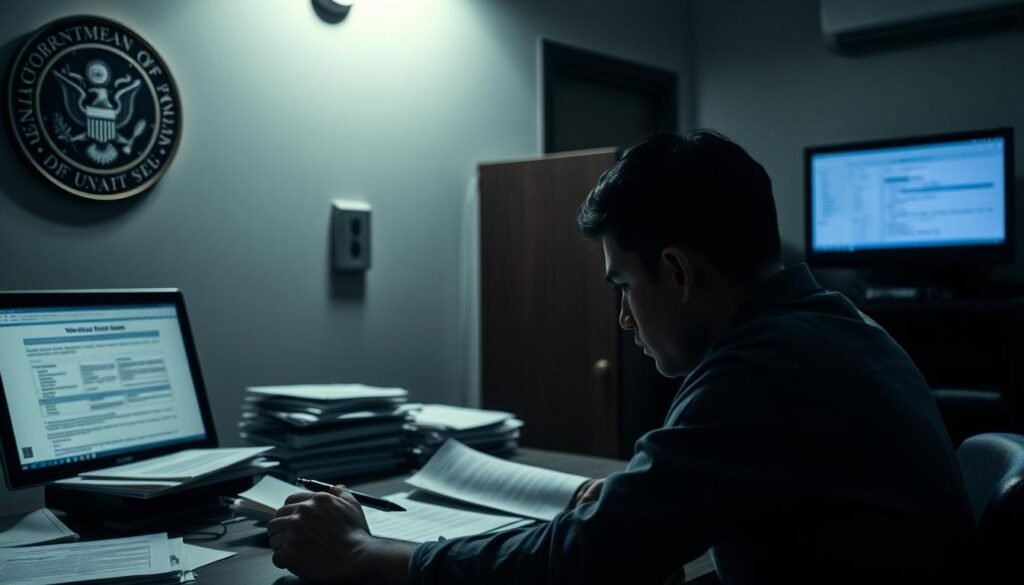Last updated on October 7th, 2025 at 07:18 am
Can Felons Visit Mexico? If you’re planning a trip to Mexico with a criminal record, understanding the country’s entry requirements is crucial.
Mexico has its own set of rules for people with criminal backgrounds. Knowing these rules will help you have a smooth journey.
Before making travel plans, it’s essential to know that having a felony doesn’t automatically bar you from entering Mexico. But, there might be some restrictions.
Researching the specific requirements and potential risks involved will ensure you’re well-prepared for your trip.
Contents
- 1 Understanding Felony Convictions and International Travel
- 2 Mexico’s Entry Requirements for Visitors
- 3 Can Felons Go to Mexico on Vacation?
- 4 The Visa Application Process for Those with Criminal Records
- 5 Risks and Consequences for Felons Traveling to Mexico
- 6 Rehabilitation Certificates and Pardons
- 7 Benefits for Travelers
- 8 Conclusion: Can Felons Visit Mexico?
- 9 FAQ
- 9.1 Can I enter Mexico with a felony conviction?
- 9.2 What documents are required for a felon to enter Mexico?
- 9.3 How do I disclose my criminal record when applying for a Mexican visa?
- 9.4 Can a rehabilitation certificate or pardon improve my chances of entering Mexico?
- 9.5 What are the risks of traveling to Mexico with a felony conviction?
- 9.6 How can I find out if my specific felony conviction will prevent me from entering Mexico?
- 9.7 Are there any specific visa requirements for felons traveling to Mexico for vacation?
- 9.8 Can I be denied entry to Mexico if I have a felony conviction?
Understanding Felony Convictions and International Travel
If you’re a felon planning to travel internationally, knowing the impact of your criminal record is key. Different countries have different rules for people with felony convictions.
Some places might not let you in if you have a criminal record. Others might have special rules or needs. For example, some countries might need a visa, even if you’re just passing through. It’s important to check the travel rules for felons before you go.
Felons traveling abroad should know the possible dangers and outcomes. These could include being detained, deported, or not allowed to enter the country.
- Understand the visa requirements for your destination.
- Research any travel restrictions for felons imposed by the countries you plan to visit.
- Consider consulting with a legal expert or travel advisor familiar with international travel restrictions for felons.
Knowing the travel rules for felons and understanding how your conviction affects international travel can make your trip easier.
Mexico’s Entry Requirements for Visitors
To make your entry into Mexico smooth, knowing the necessary documents and rules is key. Most travelers need a valid passport to get in. Check if you need a visa, as it varies by nationality.
Documents Required for Entry into Mexico
A valid passport is the main thing you’ll need. Make sure it’s good for at least six months after you plan to leave. If you’ve been convicted of a felony, you might face extra checks. Be ready to talk about your criminal past.
Here are the main things you’ll need:
- A valid passport
- A Mexican visa (if required based on your nationality)
- Proof of onward travel
- Evidence of enough money for your stay
It’s smart to carry extra documents like your travel plans and hotel booking. Felons should know their criminal history well. Being ready to talk about it can help.
Can Felons Go to Mexico on Vacation?
For those with a felony record, going on vacation in Mexico might seem uncertain. This is because Mexico has strict entry rules. It’s a favorite spot for U.S. travelers, but those with criminal pasts might find it hard to get in.
Whether a felon can visit Mexico depends on their crime. Mexico’s immigration rules are tough. Some crimes, like violent felonies or drug trafficking, can keep you out.
To understand your chances, look at the types of felonies and how Mexico sees them. Here’s a quick guide:
| Type of Felony | Likelihood of Entry to Mexico |
|---|---|
| Non-violent crimes (e.g., theft, fraud) | Possible, depending on the specifics of the case |
| Violent crimes (e.g., assault, battery) | Less likely; may be denied entry |
| Drug-related crimes | Highly unlikely; often results in denial |
It’s key for those with felonies to know these points before planning a trip to Mexico. Talking to the Mexican embassy or a lawyer can help clear things up.
The Visa Application Process for Those with Criminal Records
Applying for a Mexico visa with a felony conviction has several steps. It’s important to know the process and the need to share your criminal record. This is key to a successful application.
When you apply for a Mexico visa with a criminal record, you must:
- Disclose your felony conviction on the visa application form.
- Provide supporting documentation, such as court records or a police certificate.
- Demonstrate rehabilitation or a pardon, if applicable.
Not telling about your criminal record can lead to visa denial or a ban from Mexico. Being honest and providing all needed info is crucial to avoid issues.

The visa application for felons is a detailed review of your criminal history and other factors. Having all necessary documents and following the process well can help your chances of success.
Important things to consider are:
- The nature of your felony conviction.
- The time since your conviction.
- Any rehabilitation or pardon you’ve received.
Risks and Consequences for Felons Traveling to Mexico
Traveling to Mexico with a felony conviction comes with risks and legal issues. Mexico is a favorite spot for many, but its laws can be tough for those with criminal records.
One big risk is being turned away at the border. Mexico can deny entry to anyone with a criminal record. Even if you get in, you might still face legal problems while there.
Legal troubles for felons in Mexico include:
- Being detained or arrested if your record is found.
- Being deported back to the U.S. if you break Mexican laws or are seen as a threat.
- Facing fines or penalties for breaking specific laws or rules.
- Learn about Mexican laws and rules before you go.
- Get advice from a lawyer who knows about travel rules for felons.
- Make sure you have all the right documents, like a valid passport and any needed visas.
Knowing these risks and taking steps to avoid them can make your trip to Mexico safer and more fun.
Rehabilitation Certificates and Pardons
For those with felony convictions, getting a rehabilitation certificate or pardon is key. These documents prove you’ve turned your life around. They can help lift travel restrictions, including to Mexico.
When you apply for a visa or enter Mexico, showing these documents matters a lot. They tell the Mexican authorities you’ve changed and are no longer a risk.
Getting these documents varies by state and the type of crime. You’ll need to file a petition, show proof of change, and might have to go to a hearing.
Benefits for Travelers
| Document Type | Purpose | Benefit for Travel |
|---|---|---|
| Rehabilitation Certificate | Proves rehabilitation | Eases entry restrictions |
| Pardon | Forgives the conviction | Improves visa application chances |
Having a rehabilitation certificate or pardon doesn’t mean you’ll get into Mexico right away. But it definitely helps. You must also meet all other entry rules and be ready to talk about your crime and how you’ve changed.
By doing this, you can regain your travel freedom. You can then enjoy trips to Mexico or other places you want to see.
Conclusion: Can Felons Visit Mexico?
Traveling to Mexico as a felon needs careful planning. You must understand the legal requirements and risks. Knowing Mexico’s entry policies and your felony’s impact is key.
It’s important to know the visa application process well. You must reveal your criminal record and provide all needed documents. This helps avoid entry denial or other problems.
Think about the risks and consequences of your trip. Weigh the good parts of your journey against the possible dangers. Take steps to lessen any issues that might come up.
Being well-informed and prepared helps you make a better decision. Make sure to check Mexico’s entry rules and the visa process. This ensures a smooth trip for you.
See Also: Can a Felon Get Their Gun Rights Back?
FAQ
Can I enter Mexico with a felony conviction?
Mexico’s rules for felons entering the country change based on the crime. They look at the crime and other things when deciding if you can come in.
What documents are required for a felon to enter Mexico?
You’ll need a valid passport. You might also need a visa, depending on where you’re from. They might ask for more papers because of your felony.
How do I disclose my criminal record when applying for a Mexican visa?
You’ll have to tell them about your criminal record when you apply for a visa. Not telling them can lead to your visa being denied.
Can a rehabilitation certificate or pardon improve my chances of entering Mexico?
Yes, a certificate or pardon can show you’ve changed. It might help you get into Mexico.
What are the risks of traveling to Mexico with a felony conviction?
Traveling with a felony conviction in Mexico can be risky. You could face legal trouble if you break any laws.
How can I find out if my specific felony conviction will prevent me from entering Mexico?
The best thing to do is talk to the Mexican authorities or an embassy. They can tell you what you need to know about your case.
Are there any specific visa requirements for felons traveling to Mexico for vacation?
Felons might face extra checks when applying for a visa. The rules depend on the crime and other things.
Can I be denied entry to Mexico if I have a felony conviction?
Yes, you could be turned away if you have a felony. It depends on the crime and Mexico’s rules at the time.

Van Maldonado, born in California, holds a degree in Criminology and Police Science. Currently serving as an investigative officer at a local police station, he spends his leisure time writing insightful content for FelonScope.com.

